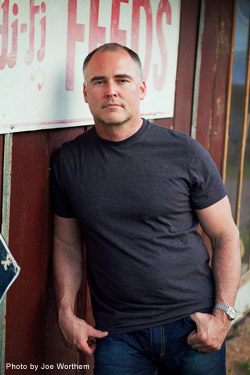Backwoods Noir
Ace Atkins—best known for his historical crime fiction—launches a contemporary series that captures a bleak Southern landscape
There’s an old saying in Tennessee and a few neighboring states, trotted out whenever new statistics are released on education funding, meth addiction, teen pregnancy and similar indicators of social backwardness: “Thank God for Mississippi.” It is this mythical Mississippi, a gothic green hell of ignorance and corruption, that veteran crime writer Ace Atkins brings disturbingly to life in The Ranger, published as the first installment of a new series. Set in fictional Tibbehah County (think Yoknapatawpha thrust into the twenty-first century), the novel introduces Quinn Colson, the late-twenty-something title character, on leave from yet another combat tour in Afghanistan to bury his uncle, the county sheriff and an apparent suicide. What he finds at home just ain’t right, and he intends to set things straight.
The novel opens as Quinn, driving a beat-up pick-up down a narrow highway late at night, slams on the brakes to avoid hitting a pregnant teenager. Giving her a lift he learns she is hunting the father of her unborn child, who, it turns out, has fallen in with a group of End Times white supremacists connected to meth manufacture and distribution. As Colson attends his uncle’s funeral, reconnects with his alcoholic mother, and eventually finds his exotic-dancing-long-lost sister, he realizes that the meth ring has touched his family and his hometown in various sinister ways. Like Clint Eastwood riding into a lawless, depressed town at the edge of an Italian desert, Colson squints at an abyss of greed and fear, and determines to save the townspeople—no matter the cost.
 While the influences of noir fiction and Faulkner can both be seen in Atkins’s characters and settings (and he is quick to point out in interviews that Faulkner wrote the screenplay to The Big Sleep), the influence of the Western is equally strong. In a jacket blurb, John Sanderford compares the book’s “feel” to Shane and High Noon, but it is really more like High Plains Drifter: the bleakness of both the physical and moral setting drives the plot inexorably toward violent vigilante action. Here’s Colson en route to track down one of a dozen meth “cook shops” operated by a skinhead prophet named Gowrie: “They drove up through wide hills and down into valleys that used to be farms but now had mainly become rows of pine for timber. The land had been stripped and planted and then clear-cut down to nothing, making the whole landscape feel used.” Here he is en route to pick up his childhood friend Boom, a veteran who has come home from the Mideast without an arm: “Where the paved road ended, a gravel path grew under his tires, curling up to the north in a single lane of more dirt and gravel, signs for PRIVATE LAND and hunt clubs and logging companies nailed onto pine trees. This was the place where people came to dump their old refrigerators and washers and car parts, in the long ravine choked with last year’s pine straw and faded beer cans and diapers and old plastic dolls. Quinn wished he had a beer right now as he drove, searching for music on the radio but finding only messages of salvation and digs at the sinners of this world.”
While the influences of noir fiction and Faulkner can both be seen in Atkins’s characters and settings (and he is quick to point out in interviews that Faulkner wrote the screenplay to The Big Sleep), the influence of the Western is equally strong. In a jacket blurb, John Sanderford compares the book’s “feel” to Shane and High Noon, but it is really more like High Plains Drifter: the bleakness of both the physical and moral setting drives the plot inexorably toward violent vigilante action. Here’s Colson en route to track down one of a dozen meth “cook shops” operated by a skinhead prophet named Gowrie: “They drove up through wide hills and down into valleys that used to be farms but now had mainly become rows of pine for timber. The land had been stripped and planted and then clear-cut down to nothing, making the whole landscape feel used.” Here he is en route to pick up his childhood friend Boom, a veteran who has come home from the Mideast without an arm: “Where the paved road ended, a gravel path grew under his tires, curling up to the north in a single lane of more dirt and gravel, signs for PRIVATE LAND and hunt clubs and logging companies nailed onto pine trees. This was the place where people came to dump their old refrigerators and washers and car parts, in the long ravine choked with last year’s pine straw and faded beer cans and diapers and old plastic dolls. Quinn wished he had a beer right now as he drove, searching for music on the radio but finding only messages of salvation and digs at the sinners of this world.”
In lesser hands, such wasteland images, set amid the conventions of both the hard-boiled detective novel and the spaghetti western, would likely devolve into one cliché after another—entertaining perhaps, but no more original than the old saw, “Thank God for Mississippi.” What saves The Ranger, however, is Atkins’s obsession with research and his eye for detail. His previous historical works painstakingly recreated classic gangster settings such as Memphis in 1937, combining rare archival information, eyewitness interviews, and personal investigation to achieve a level of realism that surpassed the genre-based plots. Atkins brings this same care to the characters of Tibbehah County, where the good, the bad, and the ugly may be grotesque but are also grippingly human, as real as the stark statistics of a poor and uneducated place. A reader can’t help but root for Quinn Colson—and look forward to his future efforts to restore some semblance of dignity and justice to a small corner of Mississippi.
Ace Atkins will read from The Ranger on June 21 at 6 p.m. at The Booksellers at Laurelwood in Memphis.


